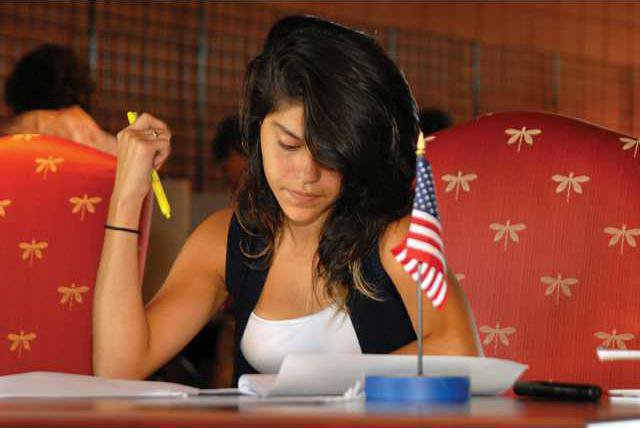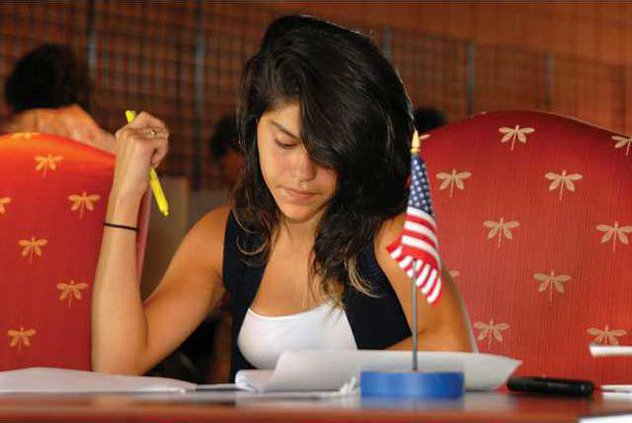Every four years, Vinny Saponara would watch as his parents cast votes for their candidate of choice.
It didn’t mean much at the time, but now that he’s 18 it’s his turn.
“You never really think about it ... it’s kind of surreal,” said the North Forsyth High School senior. “This is one of the most important elections of our lives, and it’s probably going to shape how the next 20 to 30 years are going to look in America.”
Saponara will take part in his first national election in November, but he got to practice Thursday during his school election.
Through the Forsyth First Vote program, Saponara and about 2,000 other students got to cast a ballot on the same electronic voting machines used during local and national elections.
Through the program, which has been offered for five years, Forsyth County’s elections department ran the high school’s election with the help of student volunteers.
“We feel it’s going to help the students become used to voting and really get involved, so when they do become old enough to vote, they’ll be able to do it without fear,” said Gary J. Smith, the county’s chief of elections.
“From the statistics we’ve looked at, we’re finding that since we implemented the first voter program, we’re getting a higher percentage of young people voting.”
And come Nov. 4 those young people and the rest of Forsyth County’s nearly 95,000 registered voters will be able to weigh in on the presidential race, as well as some state and local contests and two Forsyth County bond referendums.
Last week, each of the four grade levels voted for the students with the most spirit, best sense of humor, most athleticism and potential to succeed, among other categories. The seniors also decided on their class officers.
As in primary elections, where Democrats receive one ballot and Republicans receive another, each grade level had a specific ballot with relevant questions.
Steven Adamson, 18, has already registered to vote.
“It’s a big year,” he said. “We’re deciding the next four years.”
There wasn’t enough time Thursday to wrap up North’s election during the two-hour staggered lunch window, so the balloting carried over to Friday.
While some of the school’s 2,000 students were interested in the winners, Savannah Sanders was mainly interested in the process.
“It’s helping me realize how important it is to cast your own vote and not to be influenced by others,” said the 15-year-old, who was one of the student volunteers at the election.
“A lot of people are trying to influence what people think, and help them over their shoulder. But that’s high school for you.”
The Forsyth First Vote program may help with school elections, but the key focus is to recruit volunteer poll workers for county and state elections, Smith said.
While Sanders missed the minimum age of 16 by a few months, she said next year she would be “helping with the voting process.”
Getting students involved in elections, whether in school, at a national level, or anywhere in between, is crucial, Smith said.
“There’s a lot of momentum on the national basis to get the 18 to 24-year-old students voting. And one of the things we’ve found is that part of the reason they don’t vote is No. 1 because they don’t want to do anything where they don’t know what to do. And secondly, they don’t want to be voting in a location where they think it’s just old people.
“When students finish voting here, they know how to vote. And when they do go to an election place, they’ll find kids their own age actually helping to run the elections.”
Seniors at Forsyth Central High School also got to try their hands at using electronic voting machines during their senior superlative election Friday.
Taylor Bowers said using the machines seemed easier than paper ballots.
Though Friday was her first time using them, it will be good preparation for November, when the soon-to-be 18-year-old plans to vote in her first presidential election.
Bowers said she’s most excited about “being able to put my input in for a big decision in the country.”
Not all students were as excited about being old enough to vote.
Senior Amanda Warren said she’s still deciding whether to take part.
“I don’t want to vote if I don’t know a lot about it,” she said. “I don’t want to vote just to vote. I want to know what I’m voting for.”
North Forsyth senior Patrick O’Connor said he “hadn’t really thought about it actually.”
O’Connor knows which candidate he would vote for, but said he might be “just busy doing other things” on Election Day.
Because of timing, South and West Forsyth high schools’ elections will be held after Nov. 4.
“This is real life,” said Smith, as he watched hundreds of voters file in Thursday.
“This is a practical application of everything they’re learning in school, as well as getting ready for the next step they’re going to take as adults.”
It didn’t mean much at the time, but now that he’s 18 it’s his turn.
“You never really think about it ... it’s kind of surreal,” said the North Forsyth High School senior. “This is one of the most important elections of our lives, and it’s probably going to shape how the next 20 to 30 years are going to look in America.”
Saponara will take part in his first national election in November, but he got to practice Thursday during his school election.
Through the Forsyth First Vote program, Saponara and about 2,000 other students got to cast a ballot on the same electronic voting machines used during local and national elections.
Through the program, which has been offered for five years, Forsyth County’s elections department ran the high school’s election with the help of student volunteers.
“We feel it’s going to help the students become used to voting and really get involved, so when they do become old enough to vote, they’ll be able to do it without fear,” said Gary J. Smith, the county’s chief of elections.
“From the statistics we’ve looked at, we’re finding that since we implemented the first voter program, we’re getting a higher percentage of young people voting.”
And come Nov. 4 those young people and the rest of Forsyth County’s nearly 95,000 registered voters will be able to weigh in on the presidential race, as well as some state and local contests and two Forsyth County bond referendums.
Last week, each of the four grade levels voted for the students with the most spirit, best sense of humor, most athleticism and potential to succeed, among other categories. The seniors also decided on their class officers.
As in primary elections, where Democrats receive one ballot and Republicans receive another, each grade level had a specific ballot with relevant questions.
Steven Adamson, 18, has already registered to vote.
“It’s a big year,” he said. “We’re deciding the next four years.”
There wasn’t enough time Thursday to wrap up North’s election during the two-hour staggered lunch window, so the balloting carried over to Friday.
While some of the school’s 2,000 students were interested in the winners, Savannah Sanders was mainly interested in the process.
“It’s helping me realize how important it is to cast your own vote and not to be influenced by others,” said the 15-year-old, who was one of the student volunteers at the election.
“A lot of people are trying to influence what people think, and help them over their shoulder. But that’s high school for you.”
The Forsyth First Vote program may help with school elections, but the key focus is to recruit volunteer poll workers for county and state elections, Smith said.
While Sanders missed the minimum age of 16 by a few months, she said next year she would be “helping with the voting process.”
Getting students involved in elections, whether in school, at a national level, or anywhere in between, is crucial, Smith said.
“There’s a lot of momentum on the national basis to get the 18 to 24-year-old students voting. And one of the things we’ve found is that part of the reason they don’t vote is No. 1 because they don’t want to do anything where they don’t know what to do. And secondly, they don’t want to be voting in a location where they think it’s just old people.
“When students finish voting here, they know how to vote. And when they do go to an election place, they’ll find kids their own age actually helping to run the elections.”
Seniors at Forsyth Central High School also got to try their hands at using electronic voting machines during their senior superlative election Friday.
Taylor Bowers said using the machines seemed easier than paper ballots.
Though Friday was her first time using them, it will be good preparation for November, when the soon-to-be 18-year-old plans to vote in her first presidential election.
Bowers said she’s most excited about “being able to put my input in for a big decision in the country.”
Not all students were as excited about being old enough to vote.
Senior Amanda Warren said she’s still deciding whether to take part.
“I don’t want to vote if I don’t know a lot about it,” she said. “I don’t want to vote just to vote. I want to know what I’m voting for.”
North Forsyth senior Patrick O’Connor said he “hadn’t really thought about it actually.”
O’Connor knows which candidate he would vote for, but said he might be “just busy doing other things” on Election Day.
Because of timing, South and West Forsyth high schools’ elections will be held after Nov. 4.
“This is real life,” said Smith, as he watched hundreds of voters file in Thursday.
“This is a practical application of everything they’re learning in school, as well as getting ready for the next step they’re going to take as adults.”

